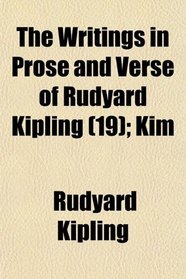Search -
The Writings in Prose and Verse of Rudyard Kipling (19); Kim
The Writings in Prose and Verse of Rudyard Kipling Kim - 19
Author:
Volume: 19 General Books publication date: 2009 Original publication date: 1902 Original Publisher: C. Scribner's sons Subjects: English literature History / General Literary Criticism / General Literary Criticism / European / English, Irish, Scottish, Welsh Notes: This is a black and white OCR reprint of the original. It has no il... more »
Author:
Volume: 19 General Books publication date: 2009 Original publication date: 1902 Original Publisher: C. Scribner's sons Subjects: English literature History / General Literary Criticism / General Literary Criticism / European / English, Irish, Scottish, Welsh Notes: This is a black and white OCR reprint of the original. It has no il... more »
ISBN-13: 9781150306983
ISBN-10: 115030698X
Publication Date: 12/22/2009
Pages: 196
Rating: ?
ISBN-10: 115030698X
Publication Date: 12/22/2009
Pages: 196
Rating: ?
0 stars, based on 0 rating




